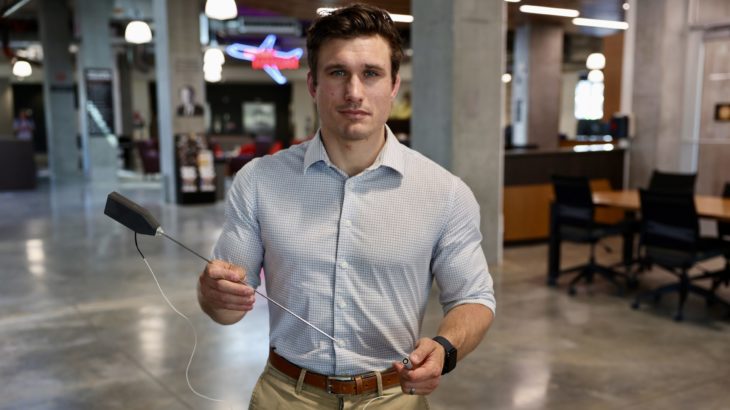Advancements in the world of medical technology are saving and improving lives every single day, but there are enduring issues with current procedures that cannot guarantee that patients will receive perfect care. That’s why there are medical innovators working around the clock to solve these issues, with a recent example being the SoundPass team at the University of Utah.
Founded by third-year medical students Matt Findlay, Travis Hotchkiss, and Jordan Johnson and fourth-year medical student Kyril Cole, SoundPass aims to vastly improve how external ventricular drains (EVDs) are placed during neurosurgery. The team recently won the grand prize at the 2023 Bench to Bedside (B2B) competition at the University of Utah.
Findlay explained that following trauma or other pathologies, patients can have swelling within their brain that requires immediate drainage. This is standardly accomplished through the placement of a catheter into the right lateral ventricle of the brain, however, due to the urgency of this procedure, image guidance is usually not possible. Therefore, this procedure is most often performed blindly. With the resultant lack of precision, numerous attempts are often required, and additional unnecessary damage is imparted to patient brains.
“This is arguably the most common neurosurgical procedure in terms of pure numbers and happens quite often on a daily basis across the country,” Findlay said. “For some people, the ventricle gets a bit displaced, and you can cause a lot of additional damage to the brain if you repeatedly miss your target.”
SoundPass adds an imaging component to this procedure by using an ultrasound-tipped stylet inside the lumen of the EVD catheter to give the surgeon visibility when performing this procedure. It is hoped that with the real-time visualization of the ventricle, patient morbidity and mortality associated with this procedure will decrease.
With more time and use of the opportunities brought about by Bench to Bedside, the team hopes to have SoundPass in the marketplace within the next few years. To expedite this process, they have partnered with an ultrasound technology firm to iterate their prototype.
“There are a lot of good innovations that aren’t seen through, but we gained a lot of momentum when we won the B2B competition,” said Hotchkiss. “Our number one priority is to see this through to the finish line.”
With students of different disciplines within medicine, the SoundPass team used their various skill sets and backgrounds to bring the device to life. Hotchkiss and Johnson both have backgrounds outside of neurosurgery, but extensive expertise in mechanical engineering and product launch, whereas Findlay and Cole both have aspirations within the world of neurosurgery and contribute with clinical knowledge and relationships. This diverse set of skills and experiences was pivotal in bringing about the team’s success.
“What I think is cool about B2B is that it can bring people together who have different skill sets to make something like this possible,” Findlay said. “The program is structured such that anybody who wants to be in the space can find a way to join a team and contribute.”



